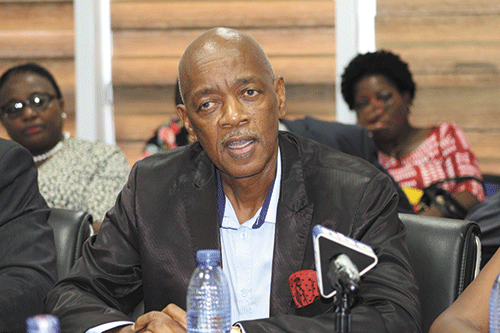With the recent US Supreme Court upholding of the dismissal of the genocide lawsuit by the US High Court, the Germany-Namibia deal regarding the “reparations” amount (which did not go down well with some of the leaders) and now the passing on of Ombara Otjitambi (Paramount Chief) Vekuii Rukoro due to Covid-19, everything that could go wrong seems to have gone wrong.
May the spirit of Ombara Otjitambi rest in eternal peace; this was a man who totally poured out his whole being into his people’s cause and we salute him for that! I do not want to comment on the merits and demerits of the US Supreme Court ruling nor on the amount offered by Germany. As it is, there is a lot of controversy around those two issues and commenting on those might not be helpful at all.
There is no doubt that due to Covid-19, Namibia is going through fires and crushing storms.
What happens when everything you believe in and live by is smashed to bits by circumstances beyond your control? Those who know me may wonder why does this man, who considers himself a nationalist and a Pan-Afrikanist, want to confine himself to the interests of only one particular section of society?
My point of departure is that before we consider ourselves as Namibians, we are born into certain cultural communities and arguing otherwise would be hypocrisy of the highest order. As I have argued in the past, there is nothing wrong in belonging to a certain ethnic group and being proud of your culture if that does not play itself out at the expense of other ethnic groups, i.e. if you do not maintain that your cultural identity is better than those of other ethnic groups. Secondly, and most importantly so, we need to bring our ethnic cultural identities to the table to weave “the grand Namibian cultural tapestry” – this is what sociologists call cultural unity in diversity.
This opinion piece has been motivated by a dear friend who asked me the other day: “Why don’t you do something to try to bring about unity amongst the different traditional leaders?” The disunity and infightings that I see amongst our traditional leaders pain me to the core because that affect the subjects they lead. The first question that many readers may want to ask is perhaps this: who gives Tjihenuna moral authority to preach unity amongst Ovaherero and Ovambanderu traditional leaders? To be honest, I am the least qualified to do that.
However, I feel duty-bound to suggest a few thoughts, for what it is worth. I think I can humbly claim some moral authority because of the following: In terms of ancestral bloodline, I am 25% Omumbanderu and 75% Omuherero and secondly, I did not have to learn from textbooks what the Germans had done to our people during the 1904 – 1908 genocide. My mother’s father was German who wanted to kill her as a baby because he was “embarrassed” to have fathered a child with an African woman. My father’s parents were part of the remnant that had fled to Botswana during the 1904 – 1908 genocide.
He was born there, grew up there and was buried there. I am a grandnephew of the legendary Hosea Kutako, a well-known fact for those who care to know. Lastly, those who know me would testify that I do not associate myself with any traditional authority – therefore in calling for unity I am not pushing a particular agenda.
Over many years the Ovaherero and Ovambanderu have not been seeing eye to eye, although, as far as I am concerned the cultural differences are artificial, if any. As if that was not enough, the Red Flag followers are now divided into factions, the White Flag followers are also divided into factions and so are the Green Flag followers (Ovambanderu).
Is this state of affairs really normal? I think it is high time we did some serious soul-searching and ask some hard questions. One of the contributing factors to this disunity, and certainly not the only one, is the title of Paramount Chief which the followers of Ovaherero Traditional Authority (OTA) bestowed upon their leader, much to the dismay of the rival groups. I must hasten to add here that I am not attaching value judgement to this, i.e. I am not saying that that is correct or wrong. I spoke to an inside source within the OTA after the passing on of Ombara Otjitambi and his view was that, for the sake of unity amongst the various traditional chiefs, it was perhaps high time they re-visited that title.
I was educated in the former Yugoslavia, which was a federation composed of different nations and nationalities that were culturally diverse. Their first President Josip Broz Tito was not only very charismatic, but he also had this special quality: he was born to a Slovene mother and a Croat father and was for the most part based in Belgrade (the then capital and which is mainly Serbian). This enabled him to keep the ship floating.
However, after his death in 1980 they realised that no one could step into “his big shoes” and they introduced a rotating presidency. In other words, after every five years the president had to come from a different republic out of the six republics. If there is a strong feeling of continuing with the title of a Paramount Chief, my humble suggestion is that this could be done on a rotational basis whereby each of the chiefs will be given two years or so to occupy that position. This is how I dream the size of the Ovaherero/Ovambanderu unity.
My parting shot is, sometimes the reversals of what we expect from God come to us as individuals or as communities. When it happens, does catastrophe work to reform our lives to conform to who God actually is or to the way we imagine or wish Him to be?


